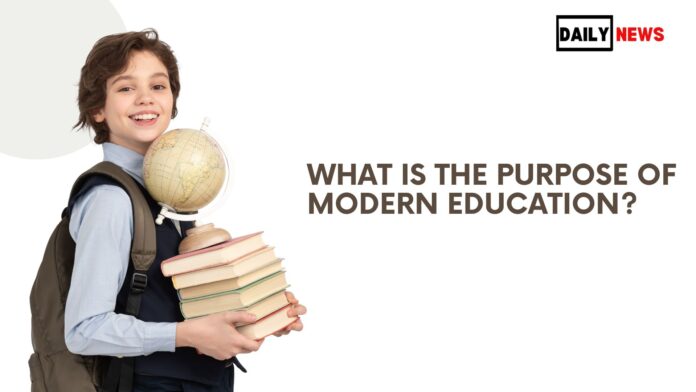Modern education plays an integral role in shaping individuals and societies to meet the demands of a rapidly evolving world. It is no longer confined to the traditional goal of imparting knowledge; instead, it embraces a comprehensive approach to empower individuals, nurture creativity, and foster a sense of global responsibility. Below, we explore the multifaceted purpose of modern education in detail.
1. Equipping Individuals with Practical Knowledge and Skills
The foundation of modern education lies in its ability to provide individuals with the tools they need to navigate life effectively.
Developing Critical Thinking
Modern education encourages students to think critically and analyze situations rather than simply memorize information. This ability to evaluate problems and make informed decisions is essential in both personal and professional contexts.
Promoting Digital Proficiency
As technology continues to transform industries, digital literacy has become a cornerstone of education. Schools and universities now teach students to use digital tools, adapt to emerging technologies, and stay competitive in the job market.
Encouraging Lifelong Learning
In a dynamic world, continuous learning is crucial. Education fosters a mindset of curiosity and adaptability, enabling individuals to keep growing, acquiring new skills, and staying relevant in their fields.
2. Enhancing Personal Development
Modern education goes beyond academics to focus on the personal growth of learners, emphasizing emotional intelligence and social skills.
Building Emotional Intelligence (EQ)
Through activities like group discussions and problem-solving exercises, education nurtures emotional intelligence, helping students develop self-awareness, empathy, and interpersonal skills.
Instilling Core Values
Ethical behavior, responsibility, and respect are vital aspects of modern education. Schools focus on inculcating these values to create individuals who contribute positively to society.
Encouraging Self-Expression
Students are given opportunities to explore their passions and express themselves creatively, enabling them to uncover their strengths and build confidence.
3. Driving Economic Progress and Innovation
Education is a key driver of economic development, as it prepares individuals to contribute meaningfully to industries and communities.
Preparing a Skilled Workforce
Modern curricula are designed to meet the needs of the job market, focusing on developing technical and professional skills in fields such as science, technology, and healthcare.
Fostering Innovation
Educational institutions are hubs of creativity and research, encouraging students to explore new ideas and develop solutions to complex problems.
Promoting Entrepreneurship
Programs aimed at cultivating an entrepreneurial mindset help students learn to identify opportunities, take calculated risks, and create successful businesses.
4. Promoting Equality and Social Progres
Modern education serves as a powerful tool for addressing social inequities and building inclusive communities.
Bridging Socioeconomic Gaps
By providing access to quality education for all, societies can reduce disparities and create opportunities for upward mobility.
Championing Gender Equality
Education plays a significant role in empowering women and girls, ensuring that everyone has the opportunity to contribute to society regardless of gender.
Embracing Diversity
Schools and universities adopt inclusive policies to support students from diverse backgrounds, promoting acceptance and equality.
5. Preparing Global Citizens
In an interconnected world, modern education equips individuals to contribute as responsible global citizens.
Cultivating Cultural Awareness
Exposure to diverse perspectives helps students understand and respect different cultures, fostering tolerance and empathy.
Encouraging Environmental Responsibility
Education raises awareness about environmental issues, inspiring students to adopt sustainable practices and advocate for ecological preservation.
Facilitating Global Collaboration
Through international programs and digital learning tools, students learn to work across borders, preparing them for roles in global organizations.
6. Inspiring Creativity and Innovation
Modern education celebrates individuality by nurturing creativity and fostering an environment where students feel encouraged to innovate.
Supporting Artistic Expression
Courses in the arts provide students with opportunities to explore their talents and share their unique perspectives.
Encouraging Experimentation
By embracing a hands-on approach to learning, schools help students experiment with new ideas and think outside the box.
Recognizing Diverse Strengths
Modern education systems cater to varied learning styles and interests, ensuring that every student has the chance to thrive.
Conclusion
The purpose of modern education extends far beyond traditional academics. It serves as a dynamic platform for developing critical thinking, emotional intelligence, economic contributions, social equality, global awareness, and creativity. By fulfilling these objectives, modern education empowers individuals to lead fulfilling lives and contribute meaningfully to society.

Er. Rishav Raj (Btech Computer Science)
Dr. Rishav Raj (Bachelor of Ayurvedic medicine and Surgery)
I am a professional blogger since 12 years worked for different healthcare blog as well as health care advisor for different multinational companies as well as Software developer for different healthcare and technology based software.i am here to share you some informative blog regarding news , healthcare and technology







